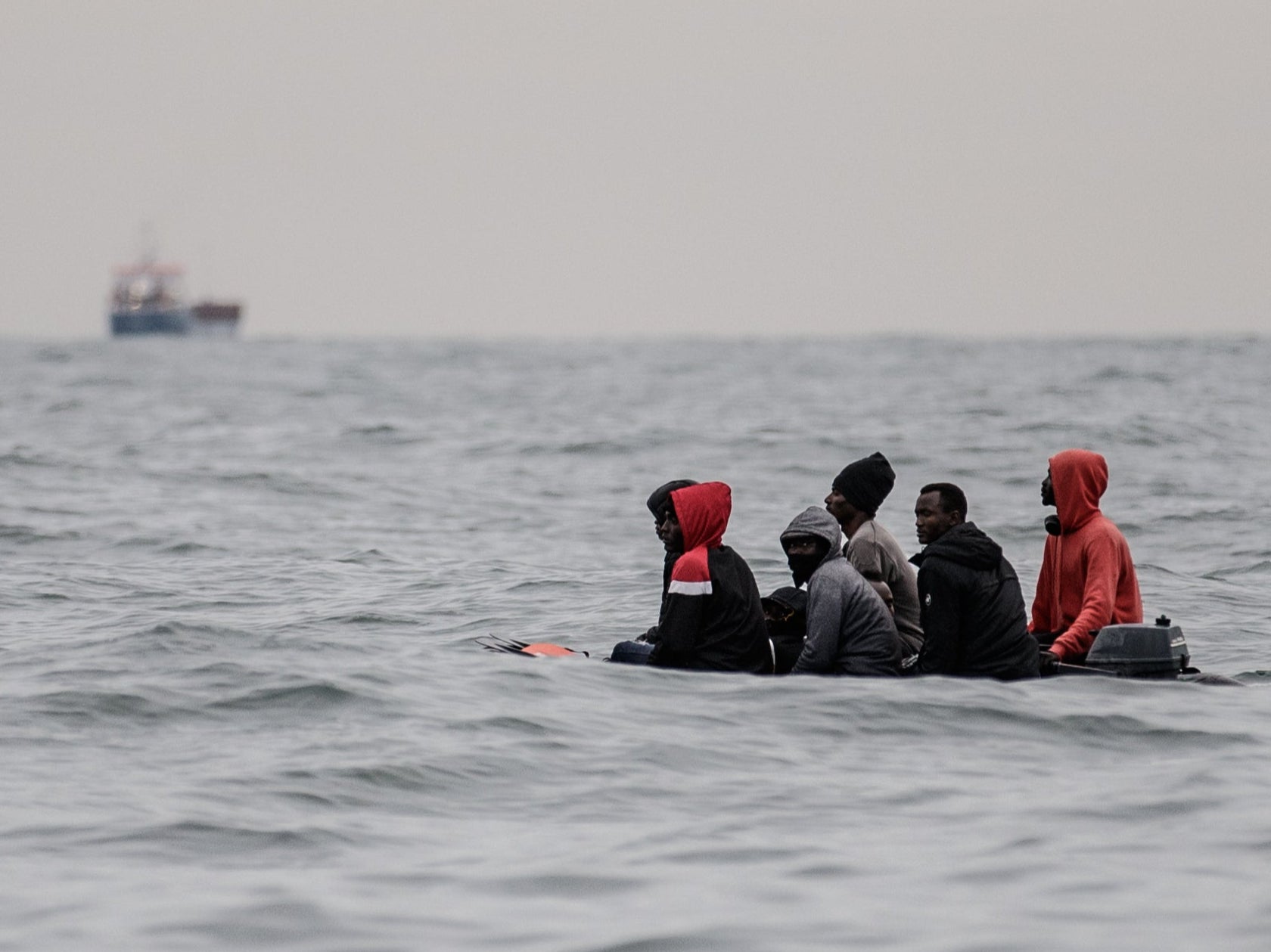‘UK far from the epicentre of the real challenge’: Rise in Channel crossings not a crisis, says UN refugee agency
‘What is sometimes being considered as an invasion, with everybody trying to get to the UK, in reality is not the case. Far more people apply and integrate in France and Spain and elsewhere,’ says UNHCR official

Your support helps us to tell the story
From reproductive rights to climate change to Big Tech, The Independent is on the ground when the story is developing. Whether it's investigating the financials of Elon Musk's pro-Trump PAC or producing our latest documentary, 'The A Word', which shines a light on the American women fighting for reproductive rights, we know how important it is to parse out the facts from the messaging.
At such a critical moment in US history, we need reporters on the ground. Your donation allows us to keep sending journalists to speak to both sides of the story.
The Independent is trusted by Americans across the entire political spectrum. And unlike many other quality news outlets, we choose not to lock Americans out of our reporting and analysis with paywalls. We believe quality journalism should be available to everyone, paid for by those who can afford it.
Your support makes all the difference.The rise in unauthorised Channel crossings is “far from being a crisis” and the numbers “pale in comparison" to those elsewhere, officials from the UN refugee agency have said in remarks that contradict comments by Home Office ministers in recent months.
The United Nations High Commissioner for Refugees (UNHCR) representative in the UK pointed out to MPs on Wednesday that while the number of refugees and migrants crossing the Channel has increased – with estimates at over 6,000 this year – asylum claims in the UK have fallen so far in 2020.
Rossella Pagliuchi-Lor told the Home Affairs Select Committee this was because the increase had corresponded with a decrease in arrivals via other routes, notably the practice of stowing away on lorries, which has been made more difficult by an increase in securitisation near the entrance to the Channel Tunnel.
She said the numbers remained “manageable for an advanced democracy with a sophisticated asylum system” such as the UK.
“The irregular crossings are dangerous – that’s a real concern for lives – but they pale in comparison with numbers elsewhere. The UK is far from the epicenter of the real challenge," she added.
Her remarks contradict claims made by the immigration minister Chris Philp the day before that the UK couldn’t take in any unaccompanied children from refugee camps elsewhere in Europe because the numbers were already “so huge” it was a “struggle to find a place for them”.
Speaking to a parliamentary committee, Mr Philp adopted the language of Nigel Farage’s notorious Brexit poster to defend the government’s refusal to ease restrictions, saying: “Not only are we already playing our part, we are playing our part to breaking point.”
His remarks were refuted by local council leaders in the UK, who pointed out that they have offered to take in refugee children transferred to the UK via safe and legal routes from EU nations.
In the year ending June 2020, the number of asylum applications including dependents in the UK was 40,591. The equivalent numbers were 133,280 in Germany, 117,225 in France, 107,055 for Spain and 71,785 in Greece.
Ms Pagliuchi-Lor also urged caution about the narrative conveyed “in the media and elsewhere” that suggests arrivals by boats represent an “almost existential danger, a threat to the UK – where in fact this but is just a different route”.
She added: “The people on the boats are the same as those you would find on the back of a lorry. I don’t see how they can be construed to present a greater threat to anyone else. They’re a few thousand individuals risking their lives to make it to the UK.
“What is sometimes being considered as an invasion, with everybody trying to get to the UK, in reality is not the case. Far more people apply and integrate in France and Spain and elsewhere.”
Home secretary Priti Patel has branded small boat crossings “totally unacceptable” and vowed to forcibly remove around 1,000 asylum seekers to EU countries they passed through before crossing to the UK.
Government statements have repeatedly labelled the crossings as illegal and branded legal representatives acting for arrivals who go on to face removal under the Dublin III Regulation as “activist lawyers”.
Ms Pagliuchi-Lor refuted the claim that the people crossing the Channel to claim asylum were acting illegally, and pointed out that, due to its geographical location, anyone who wished to claim asylum in the UK was required go through another country unless they were able to come by air.
“The refugee convention does not require asylum seekers to seek asylum in first safe country. It is possible for the UK to consider returning someone to a first safe country in Europe, but this shouldn’t be an automatic pushback,” she said.
“It is necessary to first find out whether there are reasons that make it more reasonable for that person to stay in the receiving country rather than the first country.
“The principle that individuals must claim asylum in the first safe country they reach essentially requires that every single asylum seeker remains in border countries with no one being allowed to progress beyond that. It’s incredibly impractical.”
On reports that Priti Patel ordered Home Office officials to look into building an asylum processing centre on a South Atlantic island more than 4,000 miles from the UK, Ms Pagliuchi-Lor said doing so would be “extremely inappropriate” in terms of the UK’s commitments to human rights and asylum, as well as being “incredibly impractical and expensive”.
She added: “I do hope the UK will not choose to go down this way. Doing this would really mean something even more fundamental than just a question of practicalities and finances. It will really change what the UK is – its history and the sort of values it’s stood for up until now.
“The UK has a very proud reputation in providing asylum and refuge to people across the centuries. This would be a very significant departure from that approach.”
During the same evidence session, Vincent Cochetel, the UNHCR’s special envoy for the Central Mediterranean situation, told MPs there was no “perceived attractiveness of the UK asylum system compared to other EU asylum systems”.
He added: “People don’t come to the UK because they think they will enjoy more rights than in other European countries. I think we need to be clear on that.”
Mr Cochete also raised the issue of smugglers and human traffickers targeting children on social media, often with promises of a “go now, pay later” offer, which can lead to them being exploited during their journey.
“Children often think it’s free and they won’t have to pay back, but then traffickers follow them and ransom them when they arrives in Europe. Children are often ransomed on the way to Libya. Normally they are tortured in front of a camera and the clip is sent to relatives asking them to pay,” he said.
“The kids are released until they are ransomed again, sometimes in Europe. The family can suffer consequences in the country of origin if the money is not paid.”
Ms Pagliuchi-Lor said the UNHCR was currently in talks with the Home Office about restarting its refugee resettlement scheme – which was temporarily closed in March due to the pandemic and is yet to reopen – “as quickly as possible”.
She said 11 out of 23 resettlement countries had reopened their schemes, and that the UNHCR was of the view that it was possible for the UK to restart the process.
The Independent understands that when resettlement was paused in March, there had been plans for more than 600 refugees to arrive who were subsequently blocked, meaning they remain in host countries where the pandemic has exacerbated already poor living conditions.
Ms Pagliuchi-Lor also called on the UK government to re-establish the “life-saving” Dubs scheme, designed to offer sanctuary to vulnerable unaccompanied asylum-seeking minors in Europe, after its closed in May having facilitated the transfer of 480 children.
A Home Office spokesperson said: “These dangerous crossings are facilitated by callous criminals and we are working to make this route completely unviable.
“We are determined to return those who have no right to be in the UK and are allowed to transfer asylum claimants where they could have or did claim asylum with another EU Member State. This is perfectly legal and legitimate.
“The government provides a safe and legal route to bring families together through its refugee family reunion policy. Last year 6,320 family reunion visas were issued to partners and children of those previously granted asylum or humanitarian protection in the UK, 7% more than the previous year. We expect to resume refugee resettlement activity when safe to do so.”





Join our commenting forum
Join thought-provoking conversations, follow other Independent readers and see their replies
Comments